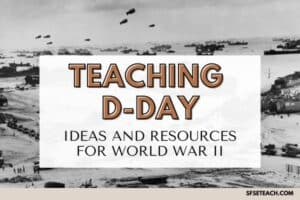Implementing Projects Provide Important Learning Opportunities for All Students
The end of the school year and the beginning of summer school can create tricky obstacles for teachers and students. As the school year ends, students are itching for summer days spent playing with friends, staying up late, and not stressing over school work. As a result, their attention and engagement begins to waver. Similar patterns happen during summer school, where students’ minds may drift away to fun plans they have for when summer school dismisses for the day. You might struggle with classroom management and rapport with students during this time. Teacher and student patience can be in short supply. One way to avoid these negative possibilities is by implementing projects into your lessons! Implementing projects will help grasp students’ attention and allow them to explore what interests them. Before they (and you) know it, the school day will be over!
Projects are Fun Solutions!
What’s one of your guilty pleasures as a teacher? Is it the secret stash of chocolate in your desk that you eat when your students aren’t looking? I’m right there with you! Another common one for teachers is playing a movie to get a few moments of peace. If the timing aligns at the end of the school year – even better! No shame, I love movies as much as the next teacher! As the end of the school year approaches and the prep for summer school begins, we look forward to moments where the students are focused on a game or movie so we can have additional time to tackle the never-ending to-do list and to take a quick breath.
As we wrap up the school year and look for ways to engage students on beautiful summer days during summer school sessions, it will be tempting to pull out all the games and the videos to create an inclusive learning atmosphere while saving some of your sanity as well. Nothing wrong with that, but don’t forget about the perks of projects!
Projects can seem daunting with the planning, preparing and implementing, but they can create fun and authentic learning experiences for all learners at all levels. Projects can be differentiated amongst individuals or between small groups. Providing a checklist for project requirements fosters an environment where students can strengthen their independent working skills (plus give you short breaks to focus on your own tasks!). You can also meet with students one-on-one or in small groups to review their progress on the project or help review previously learned concepts. Need more tips on differentiating projects? Read this blog post to get new ideas.
Are you struggling to find time to create engaging and scaffolded projects? Let me help you with this no-prep Structures Around the World Geography Project!
Why Should I be Implementing Projects?
Specifically in Social Studies, providing hands-on opportunities through projects can reach students who don’t typically jump up and down with excitement when it comes to this subject area. Projects allow students to have choice within the expectations given to them to meet the criteria of the project. When students are given options, they develop a sense of ownership and are more open to exploring what they are learning. While they are exploring and researching, they may discover a new interest of theirs!
Projects also allow students to demonstrate a more authentic understanding of the standards through their research. Not only do projects allow students to take ownership of their learning, they also are able to work on important life skills. For example, some projects can be completed within small groups. Students learn how to communicate with one another, delegate tasks, and build trust between each other as they collaborate on the project. Some may choose to present their projects to the class, which builds their confidence with public-speaking. Meeting with the teacher throughout the project will help students become used to hearing and applying constructive feedback. These are valuable skills for individuals to be successful in future projects and careers.
Ready to Start Implementing Projects? Let’s Go!
After reading this article, I hope you are able to walk away feeling a little more confident about how projects can help create authentic learning experiences with your students as you finish up the school year and begin summer school. So let’s save the movies for another time and implement engaging projects instead!
Ready to start your journey with implementing projects in your classroom? Check out this Social Studies project, Structures Around the World, that includes everything you need to create a fun learning environment!












2 Responses